| Listing 1 - 10 of 10 |
Sort by
|
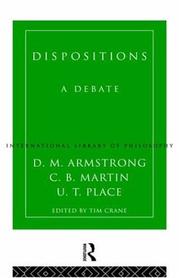
ISBN: 0415144329 9780415144322 9780415756921 0203004876 9780203004876 9781134761241 9781134761289 9781134761296 1280334592 1134688989 0415173671 0203017579 041517368X 1134761287 1134761295 1280334819 9781134688982 Year: 2014 Publisher: London Routledge
Abstract | Keywords | Export | Availability | Bookmark
 Loading...
Loading...Choose an application
- Reference Manager
- EndNote
- RefWorks (Direct export to RefWorks)
Dispositions are essential to our understanding of the world. Dispositions: A Debate is an extended dialogue between three distinguished philosophers - D.M. Armstrong, C.B. Martin and U.T. Place - on the many problems associated with dispositions, which reveals their own distinctive accounts of the nature of dispositions. These are then linked to other issues such as the nature of mind, matter, universals, existence, laws of nature and causation.
Disposition (Philosophy) --- Disposition (Philosophie) --- Disposition (Philosophy). --- Philosophy --- Metaphysics --- Analysis (Philosophy) --- Philosophie analytique --- Métaphysique --- Disposition (philosophie)
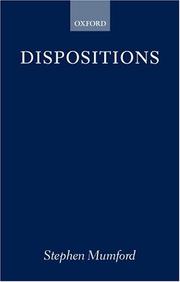
ISBN: 9780199259823 9780198236115 0199259828 0198236115 0191698636 Year: 2003 Publisher: Oxford New-York : Oxford University Press,
Abstract | Keywords | Export | Availability | Bookmark
 Loading...
Loading...Choose an application
- Reference Manager
- EndNote
- RefWorks (Direct export to RefWorks)
Disposition (Philosophie) --- Disposition (Philosophy). --- Disposition (Philosophy) --- Philosophy --- Ontology --- Ontologie --- Disposition (philosophie)
Book
ISBN: 9782889156016 Year: 2024 Publisher: Lausanne : Epistémé,
Abstract | Keywords | Export | Availability | Bookmark
 Loading...
Loading...Choose an application
- Reference Manager
- EndNote
- RefWorks (Direct export to RefWorks)
Disposition (philosophie). --- Modes de vie. --- Disposition (Philosophy) --- Lifestyles.
Book
ISBN: 9780199558933 0199558930 Year: 2009 Publisher: Oxford : Clarendon Press,
Abstract | Keywords | Export | Availability | Bookmark
 Loading...
Loading...Choose an application
- Reference Manager
- EndNote
- RefWorks (Direct export to RefWorks)
Disposition (Philosophy) --- Causation. --- Metaphysics. --- Science --- Philosophy. --- Disposition (philosophie) --- Science - Philosophy. --- Causalité --- Causalité
Multi
ISSN: 12485284 ISBN: 2271064120 9782271064127 Year: 2000 Publisher: Paris CNRS
Abstract | Keywords | Export | Availability | Bookmark
 Loading...
Loading...Choose an application
- Reference Manager
- EndNote
- RefWorks (Direct export to RefWorks)
Depuis l'avènement de la philosophie moderne au XVIIe siècle, les dispositions ont traîné une réputation sulfureuse : notions obscures, elles faisaient obstacle à une compréhension rationnelle de la nature. Attribuer à l'opium la disposition de faire dormir ou vertu dormitive, ne donne, disait-on, qu'une explication redondante, donc vide, de l'endormissement causé par l'ingestion d'opium. La philosophie des sciences du XXe siècle a ajouté ses propres raisons de bannir les prédicats de disposition (soluble, inflammable, ductile, fragile, etc.) d'une langue bien formée : aucun critère observable ne semble en effet pouvoir fonder l'attribution de solubilité dans l'eau à un objet qui ne s'y trouve jamais plongé. Le présent ouvrage se propose de montrer qu'au contraire, le recours aux dispositions est indispensable dans la plupart des explications, des plus ordinaires aux plus conformes au canon de la rigueur scientifique. Peut-on analyser les prédicats de disposition au moyen d'outils logiques nouveaux, tels que les conditionnels contrefactuels ? Quel est le rapport entre une disposition telle que la solubilité d'un morceau de sucre et sa base sous-jacente, en l'occurrence la structure cristalline du sucre ? Les dispositions peuvent-elles aider à expliquer pourquoi certaines lois de la nature ont des exceptions ? La mécanique quantique attribue-t-elle des dispositions aux particules élémentaires ? C'est à ces questions et bien d'autres que le présent ouvrage voudrait apporter des réponses.
Disposition (Philosophy) --- Science --- Philosophy and science. --- Disposition (Philosophie) --- Sciences --- Philosophie et sciences --- Philosophy. --- Philosophie --- Philosophy and science --- Philosophy --- Science - Philosophy
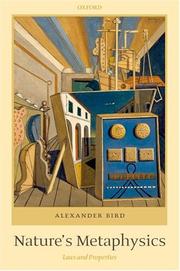
ISBN: 9780199227013 0199227012 0191711128 0199573115 9786611150013 0191527726 1281150010 1435621867 Year: 2007 Publisher: Oxford Clarendon
Abstract | Keywords | Export | Availability | Bookmark
 Loading...
Loading...Choose an application
- Reference Manager
- EndNote
- RefWorks (Direct export to RefWorks)
Metaphysics --- Metaphysics. --- Métaphysique --- Disposition (Philosophy) --- Law --- Philosophy. --- Disposition (Philosophy). --- Métaphysique --- Philosophy --- God --- Ontology --- Philosophy of mind --- Jurisprudence --- Disposition (philosophie) --- Law - Philosophy --- Law (philosophy) --- Loi (philosophie)
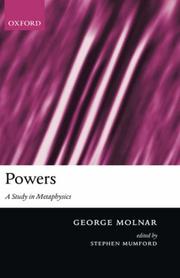
ISBN: 019925978X 0199204179 9780199204175 9780199259786 128075415X 0191514012 1429470224 019169553X Year: 2009 Publisher: Oxford Oxford University Press
Abstract | Keywords | Export | Availability | Bookmark
 Loading...
Loading...Choose an application
- Reference Manager
- EndNote
- RefWorks (Direct export to RefWorks)
George Molnar came to see that the solution to a number of the problems of contemporary philosophy lay in the development of an alternative to Hume's metaphysics. In this work, which was almost completed when its author died, he developed a thorough account of causal powers and succeeded in producing something both highly focused and at the same time wide-ranging. - ;George Molnar came to see that the solution to a number of the problems of contemporary philosophy lay in the development of an alternative to Hume's metaphysics. This alternative would have real causal powers at its centre. Molna
Causation --- Disposition (Philosophy) --- Metaphysics --- Power (Philosophy) --- Authority --- Ethics --- Philosophy --- God --- Ontology --- Philosophy of mind --- Causality --- Cause and effect --- Effect and cause --- Final cause --- Beginning --- Necessity (Philosophy) --- Teleology --- Causation. --- Metaphysics. --- power --- metaphysics --- Theory of knowledge --- Causalité --- Pouvoir (Morale) --- Disposition (Philosophie) --- Métaphysique --- Disposition (Philosophy). --- Power (Philosophy). --- Disposition (philosophie) --- Causalité --- Pouvoir (philosophie)
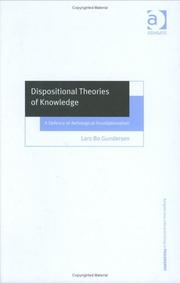
Abstract | Keywords | Export | Availability | Bookmark
 Loading...
Loading...Choose an application
- Reference Manager
- EndNote
- RefWorks (Direct export to RefWorks)
Connaissance [Théorie de la ] --- Dispositie (Filosofie) --- Disposition (Philosophie) --- Disposition (Philosophy) --- Epistemologie --- Epistemology --- Epistémologie --- Kenleer --- Kennisleer --- Kennistheorie --- Kentheorie --- Knowledge [Theory of ] --- Modality (Theory of knowledge) --- Theorie of knowledge --- Theorievorming --- Théorie de la connaissance --- Foundationalism (Theory of knowledge) --- Knowledge, Theory of --- Theory of knowledge --- Philosophy --- Psychology
Book
ISBN: 9791036201585 9791036201608 Year: 2019 Publisher: Lyon : ENS Éditions,
Abstract | Keywords | Export | Availability | Bookmark
 Loading...
Loading...Choose an application
- Reference Manager
- EndNote
- RefWorks (Direct export to RefWorks)
Si chacun a le pouvoir de vivre selon la raison, comment se fait-il que si peu la suivent, alors même qu’un grand nombre s’en réclament ? Certains voient le meilleur, mais font le pire. D’autres font le pire en croyant qu’il est le meilleur. Tous font tout ce qu’ils peuvent, et se réjouissent finalement de ce qu’ils sont. La philosophie de Spinoza rend compte de ces paradoxes : toute puissance est en acte. Qui peut le plus s’efforce nécessairement de faire le plus et ne peut faire moins. Qui peut le moins fait le moins volontiers, sans pouvoir faire plus. Chacun est aussi parfait qu’il peut l’être, et agit de la façon dont il y est disposé, malgré lui mais de gré, si ce n’est de bon gré. Le concept de disposition, tel qu’il s’élabore dans l’Éthique, permet de saisir la pratique commune des hommes dans un cadre nécessitariste et actualiste, de l’inconstance affective à la régularité des coutumes, des obsessions passionnelles à l’éducation et à l’affranchissement de la servitude. L’existence humaine n’est pas une comédie, encore moins une tragédie. Avec Spinoza, il s’agit d’en produire l’intelligence. If everyone has the power to live according to the guidance of reason, how is it that so few follow it, even though so many claim they do? Some see the best and do the worst, whereas others do the worst believing it is the best. All do everything they can and finally rejoice over what they are. The philosophy of Spinoza explains this human condition. All power is actual. He who can do the most cannot do less, and he who can do the least does so willingly, but cannot do more. Everyone is as perfect as they can be and acts the way they are disposed to, despite themselves, but readily. The concept of disposition, as it is developed in the Ethics, enables us to grasp the common practice of humans in a necessitarist and actualist context, from affective inconsistency to the regularity of habits, from passionate obsessions to education and emancipation. Human existence is…
Disposition (philosophie) --- Spinoza, Baruch --- Critique et interprétation. --- Philosophy --- disposition --- puissance --- actuel --- nécessité --- Spinoza --- power --- actual --- necessity --- Spinoza, Benedictus de, --- Spinoza, Benedictus de --- Ispīnūzā, --- Spinoza, Baruch, --- Espinoza, Baruch d', --- Sbīnūzā, --- Espinosa, Baruch de, --- de Spinoza, Benedictus --- Shpinozah, --- Shpinozah, Barukh, --- Spinoza, Benedict de, --- Spinoza, Benedict de --- Spinoza, Barukh, --- Spinoza, Baruch de, --- Spinoza, Benoît de, --- ספינאזא, ברוך דע --- ספינאזא, ברוך, --- שפימוזה, ברוך --- שפינאזא, בענעדיקט --- שפינאזא, ברוך --- שפינאזע, ברוך --- שפינוזא, בנדיקטוס --- שפינוזהת ברוך, --- שפינוזה, ברוך --- שפינוזה, ברוך די, --- שפינוזה, ברוך, --- שפינוזה, ב. --- سبينوزا، بندكتس
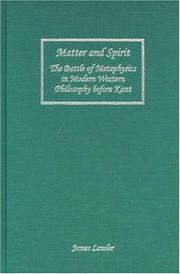
ISBN: 1580462219 9786611741266 1281741264 158046663X Year: 2006 Publisher: Rochester, NY : University of Rochester Press,
Abstract | Keywords | Export | Availability | Bookmark
 Loading...
Loading...Choose an application
- Reference Manager
- EndNote
- RefWorks (Direct export to RefWorks)
This narrative shows how the contours of moral and political philosophy in the seventeenth and eighteenth centuries were shaped by Kant's two distinct philosophical responses to the results of modern science. This history of early modern Western philosophy takes its inspiration from Kant's claim that the battle between the metaphysics of matter and that of spirit is the principal axis around which modern philosophy up to his time, in all its aspects, has revolved. The empiricist-materialist trend that dominates in England is first examined in the progressively unfolding works of Hobbes, Locke, Berkeley, Hume, and Adam Smith. A contrasting and competing dialectic develops in the rationalist/spiritualist trend in the continental philosophy of Descartes, Leibniz, and Rousseau. Framing this history is the background context of the philosophy and science of Aristotle and the challenges to the traditional paradigm presented by the revolutionary sciences of Copernicus, Galileo, and Newton. James Lawler is Professor of Philosophy at the State University of New York at Buffalo.
metaphysique --- Metaphysique --- 18e s. --- Contribution à la métaphysique --- Et la métaphysique --- Philosophie première --- Cosmologie --- Absence et présence --- Absolu --- Accident (philosophie) --- Acte (métaphysique) --- Agent (philosophie) --- Aléatoire --- Allégorie de la caverne --- Altérité (philosophie) --- Âme --- Analogie (philosophie) --- Anomalie (philosophie) --- Apparence (philosophie) --- Attribut (philosophie) --- Bien (philosophie) --- Catégories (philosophie) --- Causalité --- Changement (philosophie) --- Chose (philosophie) --- Chose en soi --- Cogito --- Compensation (philosophie) --- Complexité (philosophie) --- Contingence --- Continu (philosophie) --- Convenance (philosophie) --- Crise (philosophie) --- Déterminisme (philosophie) --- Dieu --- Différence (philosophie) --- Disposition (philosophie) --- Donation (philosophie) --- Dualisme (philosophie) --- Entités (philosophie) --- Espace (philosophie) --- Esprit --- Esprit et corps --- Essence (philosophie) --- Éternel retour --- Éternité (philosophie) --- Événement (philosophie) --- Existence (philosophie) --- Expression (philosophie) --- Finalité --- Fini (philosophie) --- Forme (philosophie) --- Hasard --- Hylémorphisme --- Hypostase (philosophie) --- Idéalisme (philosophie) --- Idée (philosophie) --- Identité (philosophie) --- Immanence (philosophie) --- Immatérialisme --- Impetus (philosophie) --- Individu (métaphysique) --- Infini --- Intellect (philosophie) --- Limite (philosophie) --- Logos (philosophie) --- Loi (philosophie) --- Matérialisme --- Matière --- Microcosme et macrocosme --- Mode (philosophie) --- Monade (philosophie) --- Monde (philosophie) --- Monisme --- Mouvement (philosophie) --- Multiple (philosophie) --- Naturalisme (philosophie) --- Néant (philosophie) --- Nécessité --- Nihilisme (philosophie) --- Nominalisme --- Norme (philosophie) --- Nouveauté --- Objet (philosophie) --- Occasion (philosophie) --- Ontologie --- Optimisme --- Ordre (philosophie) --- Origine (philosophie) --- Participation (philosophie) --- Perfection --- Pessimisme --- Phénomène (philosophie) --- Pluralisme (philosophie) --- Possibilité --- Principe (philosophie) --- Principe d'économie (philosophie) --- Principe de raison suffisante --- Problème du mal --- Puissance (métaphysique) --- Pureté (philosophie) --- Réalisme (philosophie) --- Réalité --- Réification --- Répétition (philosophie) --- Simplicité (philosophie) --- Situation (philosophie) --- Soi (philosophie) --- Spiritualisme --- Substance (philosophie) --- Sujet (philosophie) --- Système (philosophie) --- Temps (philosophie) --- Théodicée --- Totalité (philosophie) --- Transcendance (philosophie) --- Transcendantaux --- Triade (philosophie) --- Un (philosophie) --- Universaux (philosophie) --- Universel (philosophie) --- Virtualité (philosophie) --- Weltanschauung --- Philosophie --- Aristotle. --- Copernicus. --- Empiricist-Materialist. --- Galileo. --- Kant. --- Metaphysics. --- Newton. --- Rationalist-Spiritualist. --- Western Philosophy.
| Listing 1 - 10 of 10 |
Sort by
|

 Search
Search Feedback
Feedback About UniCat
About UniCat  Help
Help News
News